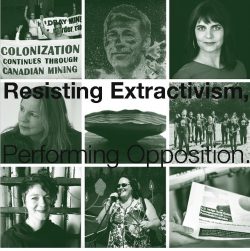Resisting Extractivism, Performing Opposition
This interdisciplinary symposium invites activists, scholars, artists, community organizers, and cultural workers to explore collective strategies of embodied and performed resistance to extractivism. While extractivism commonly refers the logic of reducing nature to commodities, and the resultant hyper-exploitation of the mining, oil, and gas industries, we can also think of extractivism as an ideology fundamental to colonialism and capitalism at their most endemic. Resisting Extractivism, Performing Opposition asks: How is (anti)extractivism performed? How have mining-impacted communities and solidarity groups alike mobilized their dissent through creative interventions? How can we, as scholars and artists, perform research that does not similarly extract community/Indigenous knowledge for our own cultural capital? How can we ethically and productively engage communities as co-researchers and collaborators without succumbing to an exploitative model of knowledge and labour extraction?
Resisting Extractivism, Performing Opposition explores extractivism as a vital issue that concerns all Canadians: resource extraction informs Canadian domestic and foreign policy, mandatory investments, and is inherent in how we conceptualize Canadian identities, mythologies, and exceptionalism. Canada’s place in the Americas is inherently tied to extractivism, and we will explore this through creative and innovative research methods, mobilized in conversations across disciplines that reach publics outside of the academy, convening artistic, activist, and scholarly communities.
Please Note: All events are FREE and open to the public, however require RSVP for refreshments via Google Forms.
For more information, please contact:
Zoë Heyn-Jones, PhD
Postdoctoral Fellow, Canadian Consortium on Performance and Politics in the Americas
Sponsorship & Support
Thank you to the Canadian Consortium on Performance and Politics in the Americas, York University’s Graduate Program in Theatre and Performance Studies, Sensorium: Centre for Digital Arts and Technology, and OCAD University’s Faculty of Liberal Arts and Sciences & School of Interdisciplinary Studies, with the support of the Contemporary Art, Design and New Media Art Histories and Criticism and Curatorial Practice graduate programs and Art and Social Change student volunteers.

